Table of Contents
Parenting cartoon “Buy that toy!”
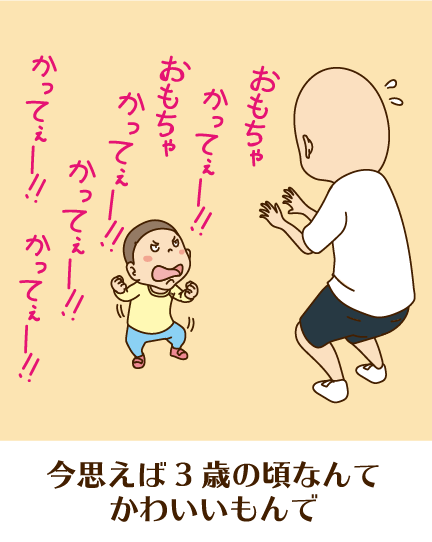
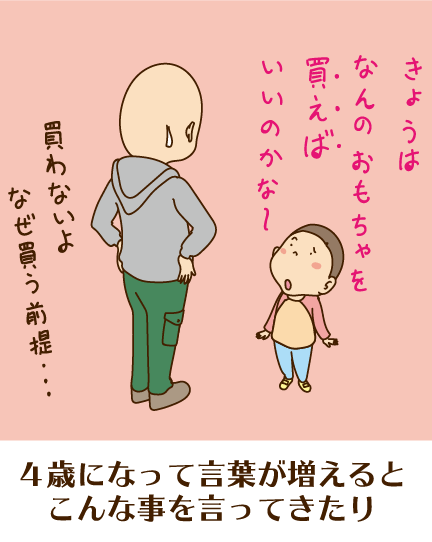
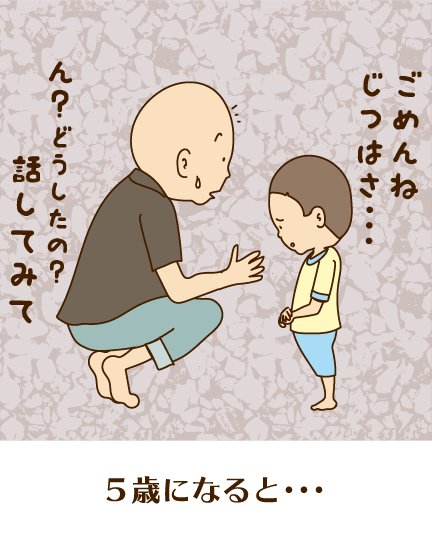
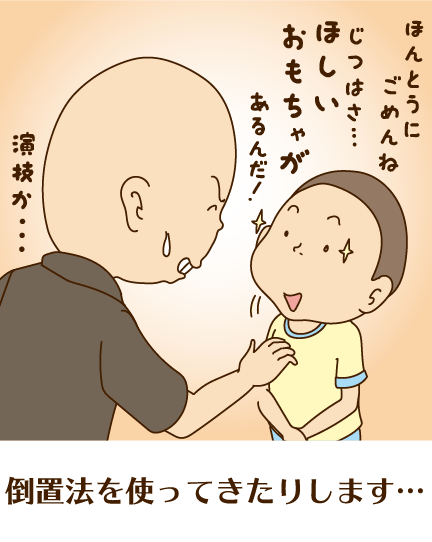

Profile
Eiichi
After working for a design company in Tokyo, he became a freelance illustrator. He is a hard-working father who creates animation, manga, and illustrations, including winning the Yubari International Fantastic Film Festival’s International Short Film Showcase Division Excellence in Animation Award.
〈Practical】Let’s get started! Housework and childcare
It’s Dad’s turn!
A collection of episodes that are immediately useful for housework and childcare
Full of tips and tricks that can be put into practice right away, including tips on how to avoid common mistakes.
Episode 1
Cooking is about reading recipes carefully!

I like to cook and I am basically in charge of dinner every day. Cooking can be done properly and deliciously if you follow a recipe. Even if I don’t get good results at work, I can get good results with cooking, so I recommend it as a stress reliever. I have three pieces of advice for novice fathers: cut corners, limit the number of dishes, and read the recipe carefully and prepare it properly.
At first, just rice and miso soup is enough. Then, if you read the recipe before you start cooking, you won’t be in such a hurry to make a mistake like, “How much is a little salt? You won’t be in such a hurry that you make a mistake. My child also compliments me on my cooking skills, which motivates me.

S.H. (39, company employee)
Lives with wife and 2-year-old girl. He has always enjoyed cooking and has been in charge of cooking since before his child was born. His specialties are Italian and Korean cuisine.
Episode 2
It’s not the play you want them to play, but the play your child wants to play.

When playing in the park, it is easy for adults to tell the children to play with these things, but rather than that, we try to match the children’s own interests and the flow of time. It is also useful to have a change of clothes, snacks and drinks, as well as a plant/insect book and a plastic bag from the supermarket in which the child can put things he or she has picked up.
Our recommendation is to take a magnifying glass and take a walk. Both adults and children will make new discoveries and enjoy themselves honestly. Children’s “Why? Why? without being bothered by the hassle. Playing in the park is a chance for children to develop their imagination. Create an environment that allows children to think for themselves and give answers freely, so that you and your child can have a fun time together.

Masakazu Hasebe (age 41, outdoor producer)
Lives with his wife and 6-year-old girl. Director of Be Nature Ltd., which develops projects with the theme of connecting people, nature, and society. Author of “Nature Education” (Mikuni Shuppan) and other books.
Episode 3
Half-day trip with kids on a whim
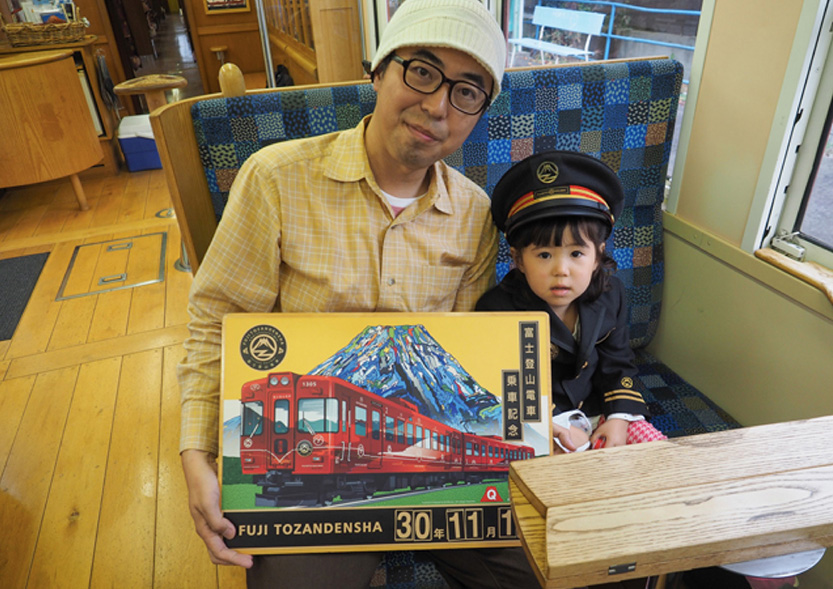
Overnight trips with children require careful preparation in advance, including transportation and hotel reservations, but if you can go and return in half a day, you can easily go on a spur-of-the-moment trip. I have decided on three things: places that can be visited with children, a relaxed schedule so that we can leave in the morning and have dinner at home, and not going to crowded places such as theme parks.
Recommended half-day trips from Tokyo are Hadano Togawa Park, where you can play in the river and barbecue, and Tove Jansson Akebono Children’s Forest Park, where both adults and children will be soothed by the world of the Moomins. It is also important for couples to discuss and decide on the destination and purpose of the trip.

Tomokazu Yoshida (age 42, travel writer)
Lives with his wife and two girls, ages 3 and 1. He started his career as a travel writer after his first trip around the world as a married couple. In recent years, he has been focusing on “half-day trips. He is the author of “Half a Day Trip from Tokyo” (Wani Books) and other books.
Episode 4
Magic tricks to convey magic to children
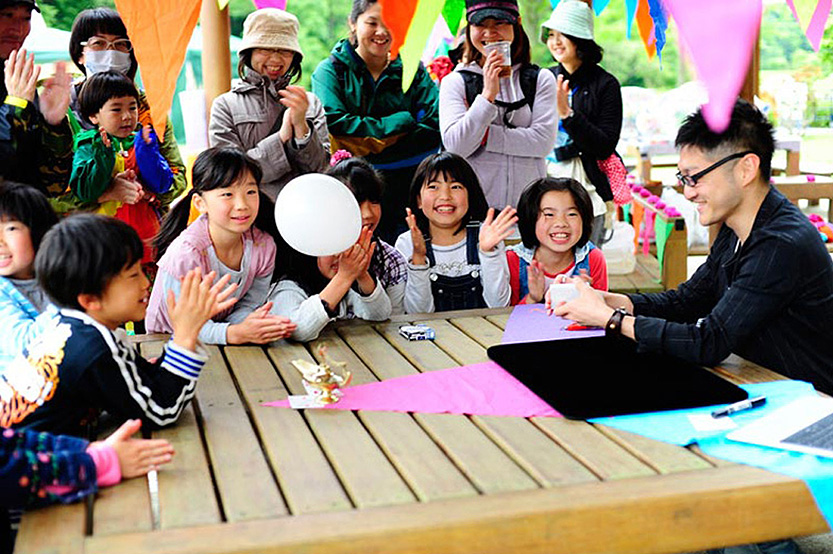
Since showing magic on a daily basis diminishes the freshness and charm of the magical trick, I try to limit my magic performances to special situations such as a gathering of friends or a daddy’s party for my children. The kids seem to think that “Dad is doing magic tricks to make everyone happy.
Some magic tricks that can be performed without special tools include using disposable chopsticks and tissues. If you search the Internet, you can find how to do magic for beginners. Children will also be delighted with the kind of magic sold in the magic section of department stores. Children love to have fun, and they also love adults who are having fun. I think the magic of magic is that dads can enjoy themselves and make their children happy while having fun themselves.

Magician KOJI (39, professional magician)
Lives with his wife and 2-year-old girl. He has always loved cooking and has been in charge of cooking since before his child was born. His specialties are Italian and Korean cuisine.
Episode 5
Local community buses are a big hit with children
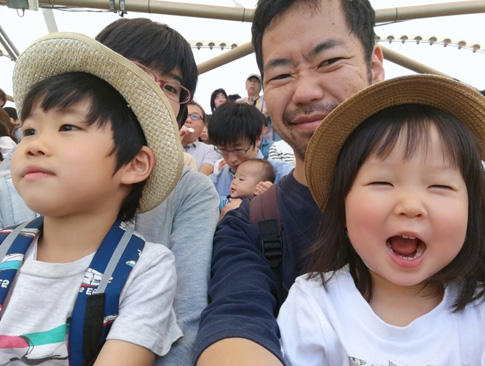
When going out with children, a backpack, change of clothes, hand towel, and handkerchief are essential. The best places to go are places you are familiar with, such as parks and children’s centers. We sometimes find out where to go by gathering information on parenting apps and social networking sites, or by going to popular events or theme parks. We bring toys, picture books, snacks, etc. to keep the children occupied.
For meals on the go, we make full use of fast food and family restaurant apps to quickly find places that are easy to get into with children. Coupons are also a great way to save money. A convenient option is the local community bus. It’s cheap, relaxing, and the kids love it. Sometimes we go out of our way to ride it because we feel like an event, even if it’s a long way around. When going out with children, the most important thing is for parents to relax and spend time with their children without being overzealous.

S.H. (39, company employee)
Lives with his wife, a 6-year-old boy, and a 3-year-old girl. Even though he is busy at work, he is empowered by the time he spends with his children. She loves going out with her children.
Parenting tips from a “dad who is good friends with his 26-year-old and 20-year-old sons.
How can I stay close to my child for a long time?
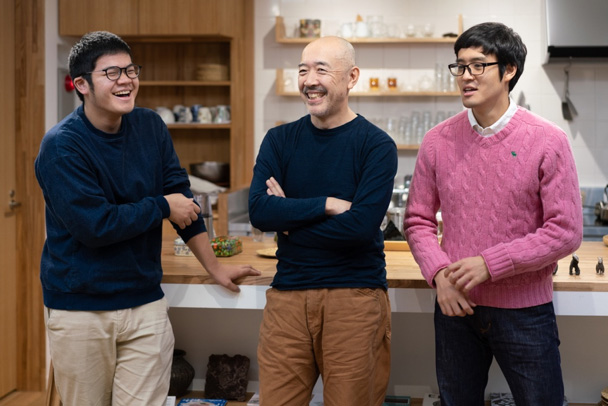
I want you to live as you are, as you like.
Show children in a natural way, including their weaknesses.
Masahiro Oguri, a writer specializing in the food genre, raises his children with his wife, who works with him, and their sons, now 26 and 20 years old. They are still close friends, camping together and instructing each other on how to behave at a soba restaurant. How was this relationship nurtured? We asked Oguri about his father’s parenting.
–I am a father who is very close with my sons.
Hmmm…we didn’t do anything special. But I kept a journal from the day I found out I was having children until they each turned one year old, every day. If I told my kids about it, they might be annoyed, but it was great for me.
Unlike women, whose physical condition changes on a daily basis, it is difficult for men to feel that they are becoming parents. I didn’t write much, but I wrote about how my wife seemed sluggish today, what she was able to eat, or small changes I noticed in my children after they were born. Whatever it was, I just kept writing every day. Writing made me more aware of becoming a parent and of raising children.
–He is the original “bento man” who has been making his children’s lunches for 20 years.
If someone didn’t cook, there would be no lunch for the children, and it is safer to make your own food than commercial products, and cooking is fun.
In fact, one of the few rules in our house is that we eat dinner together. It is fun to cook together, and if we can make them realize that it tastes good when we eat together, then there is no need for anything else. Eating is the basis of life.
Perhaps because they have watched my wife and I work together to cook, even when we are busy with work, our children naturally help out in whatever ways they can. Since they started junior high and high school, they have done all the cleanup work.

My parents are the reason I can go to a friend’s house and treat them to a meal and help clean up normally,” said Sakuya, the second son.
–Besides lunch boxes, was there any other childcare that you were mainly in charge of?
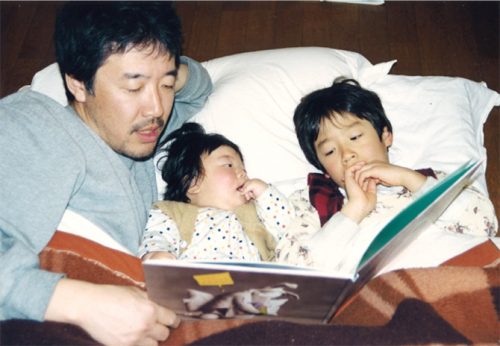
One thing I have continued to do since the birth of our child is to read picture books. My wife is exhausted from breastfeeding, daytime childcare, and work, so reading before bedtime is my responsibility. I read to her every night.
At the time of our second son’s kindergarten entrance exam, my wife was unable to come for work, so I said, “Let’s go play,” and took him out of the daycare and headed there. I was in the middle of an interview, dressed in casual clothes. The people around us were all dressed in suits, even the grandparents accompanied by a parent and child. I thought I might be intimidated because the atmosphere was so different, but when I was asked about my favorite book during the interview, my second son started talking enthusiastically about his favorite picture book, and we became completely comfortable with the teachers.
In elementary school, the boys would take baths together. It was a bathtub in a small apartment, but when I entered, my sons also entered. We didn’t talk about anything special, but it was a time to relax together.

There was a time when he would not only read us picture books, but also make up stories about the adventures of hedgehogs and play them for us,” said Chihaya, the eldest son.
–Did you and your wife make any decisions about child rearing?
From the time my children were born, I decided not to say, “You’re a man” or “You’re a boy, aren’t you?” Rather, now I think it is cool for a man to be able to unload a fish or cook meat well. I didn’t care about what the world thought was “cool. I wanted them to live the way they wanted to, just as they were.
And by the way, I have never told anyone to study. There is nothing wrong with pressure.
For example, it is okay to have likes and dislikes about food. Even if you don’t force them to eat what they don’t like, their sense of taste will change with age, and if they see someone eating something that looks delicious, they will naturally decide to try it. In the same way, rather than being told to study, if something looks interesting, they will give it a try, and if it is something they like, they will make a steady effort.

When I entered elementary school, I was the only one in my class who could not write hiragana. After that, we were given free reign over our studies, so before I reached junior high school, I realized that this was a bad idea, and I started studying.
What do the children think of such a father? Chihaya, the eldest son and an illustrator, says, “My father is a natural person who never takes things too far. He is happy to show his strengths, such as cooking, but he also shows his weaknesses to his children, so I would say that he is one of the closest friends we have.

Profile
Masahiro Oguri
He is an editor and writer in the food field, working on books and articles. She is the president of Blue Bear. She is exploring the world of food, while passing on to her sons the fun of cooking, which can bring out the best in ingredients with a little ingenuity.
Learning from Business Leaders
A collection of housekeeping and childcare ideas to put into practice immediately
Dad’s housework and childcare, how do I do it? We asked Eriko Miyamoto, author of “Kosodate Keiei Gaku” (Parenting Management), to tell us about the state of parenting among today’s fathers and some ideas for parenting that fathers would like to imitate.
Dads connect with other dads and share their parenting concerns
Mr. Miyamoto: “It seems that today’s fathers are enjoying child-rearing in a very natural way. Working together is the norm, and fathers are naturally expected to do both housework and child-rearing. Another thing is that there seems to be a flexible sense that fatherhood is different for everyone, rather than being pigeonholed into one type of “ikumen. They seem to have a good balance between work and family as part of their lives.
Recently, fathers have formed a group on Facebook to share their concerns about child-rearing and housework. They create a network to visualize their problems. It is typical of the fathers of the social networking generation to share issues and solutions with others. In “Child Rearing Management,” we interviewed fathers who are business leaders, mostly in their 30s, about their child-rearing activities. What they all have in common is that they are able to involve others in their child-rearing and household chores as a team. And what is most impressive is that they respect their wives as partners.
Although the environment and conditions for raising children vary from family to family, these are methods that can be adopted in any home. There are many situations in child-rearing and housework where you can use the skills you have developed at work. I hope you will use them as a reference and enjoy child-rearing and housework as much as I do.
Idea 1. network with other dads to share concerns
Connect with other fathers on Facebook and other social networking sites to share your problems and concerns. You may find unexpected solutions to your problems, and you will be encouraged by understanding each other’s feelings as fathers raising children.
Idea 2: Introduce a charge system among dads.
Taking turns at the daycare center, picking up and dropping off children from school, and playing with children on weekends and holidays will reduce the burden of taking care of children.
Idea 3. Involve others and raise children in the community
What a couple cannot do alone can be solved with the help of local dads, moms, and neighbors. Growing up under the eyes of many people has many advantages for children.
CASE
Taku Nishimura, President, Saw Experience, Inc.
Involving fellow neighbors, we have built a network of dependence and dependability. We practice child-rearing that relies on those around us with a feeling of asking for help, abandoning the belief that we should not cause trouble for those around us. The relationship of relying on and being depended on leads to trust, and everyone in the community can enjoy child-rearing together.
Since I am usually more likely to ask for help, I allow various children and adults to come and go freely in my home, and I take the children out together on weekends and holidays. Asking for help can be uncomfortable and troublesome, but peace of mind and fun await at the other end of the hassle.
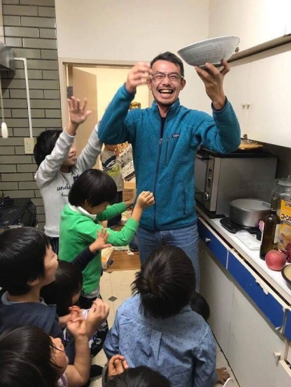
Idea 4: Parenting and housework are family projects.
The team leader for the household project should be both mom and dad, and the TODO list should be identified so that each person is in charge of the one he or she is best at. By visualizing what needs to be done, it will become clear what can be done to reduce the burden on mom and allow dad to participate.
Idea 5. Let go of what can be outsourced.
Household chores can often be made more efficient with home appliances, so proactively shorten the time with dishwashers, cleaning robots, and the like. Another way is to make good use of third parties, such as silver human resource centers. This will give you more time to enjoy child-rearing.
Idea 6. Take childcare leave.
Parenting is a limited time. Fathers are encouraged to take childcare leave and immerse themselves in 24-hour child-rearing. Knowing how rewarding, enjoyable, and difficult child-rearing and housework can be will also lead to caring for and appreciating your partner.
CASE
Mr. Daichi Onuma (Representative Director, NPO Crossfields)
I took a month of childcare leave to raise my second child. I couldn’t do zero work as a manager, so I started doing some work from home, which was the best way for me. There were many advantages, including the fact that I was able to focus all my energy on raising my child and learning to delegate authority to others. During my childcare leave, I was in charge of all household chores, which allowed me to become aware of “household chores without a name,” which I had never known before. I think I gained a deeper confidence in my role as a father and as a member of the family.
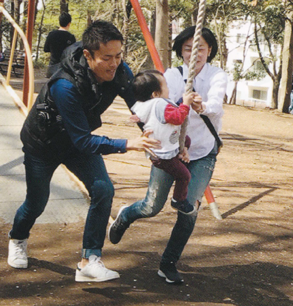
Idea 7. Experience the joy of “nurturing others.
Although child rearing often does not go as planned, being able to witness the growth of others brings me the greatest joy of all. Because you can grow as a human being through child rearing, your work relationships will also become smoother.
Idea 8. Devise a way to work.
Telework and other ways of working that are not tied to the office are on the rise. If flexible work styles are available, fathers can make more of a commitment to child-rearing. Companies that offer flexible work arrangements, such as telework and flexible work hours, are gaining popularity among fathers who are proactive about raising their children.
Idea 9: Send a message to society that fathers can easily raise their children.
Looking at child rearing from a business perspective, there are many aspects of the social environment for fathers’ child rearing that are not yet in place. One example is the lack of diaper changing sheets in men’s restrooms. Let’s continue to share our insights and experiences so that society will be more supportive of fathers raising children.
Idea 10. respect your partner.
It is the partner moms who raise the children together and run the family. By treating each other with gratitude, respect, and plenty of love on a daily basis, you can build a relationship of mutual trust. Let’s work together as a couple to overcome the various obstacles of child-rearing.

Profile
Eriko Miyamoto
Editor and non-fiction writer. Writes on the themes of work, life, and family. Together with photographer Kitchin Minoru, he leads the “Family Binding” project. Author of “Kosodate Keiei Gaku” (Nikkei BP, 2018).
husband and wife are the ultimate partners in life
Finding the “optimal solution” for the entire household is a big deal.
My level of commitment to housework and childcare is embarrassingly low. However, as a university faculty member, I can control my time even when I am busy, so I have decided that every Monday is a “stay at home” day.
I work on research and writing in the morning, and in the evening I pick up my oldest daughter, a first grader, from school. After that, I drop off my oldest son, who is in the 5th grade, at tennis class, and buy ingredients for dinner at the supermarket on my way to pick him up. My staple is a large quantity of yakisoba noodles made on a hot plate. I use 6 balls of steamed yakisoba, 1 ball of cabbage, and 1 kilo of pork at a time. This is the easiest, and besides, I cook only the meat first and can drink beer by myself while picking it up (laughs). When I’m in a good mood, I add the cabbage and noodles, and when it’s done, I call the kids.
I also clean the bathtub and fold the laundry. I try to do what I can, but my wife likes to cook and clean, so she does a lot. However, my wife, who works in development assistance, often travels overseas, and this week she is away for a week in Indonesia. The house is still running thanks to the help of my mother, who lives alone about 15 minutes away by car. My wife and mother-in-law get along really well, and sometimes when I come home around 11:00 a.m., my wife is having dinner with my mother.
I learned this well when I was working in the U.S., but relying on parents is common not only in Japan but all over the world. While also relying on parents’ help, the house is flexibly run according to the couple’s work situation. If this strengthens the unity of the family, it is a good thing, isn’t it? It satisfies my mother’s desire to be of service to her son’s family, and it also helps my wife. I know how my mother feels, so I try to thank her as much as possible.
The division of housework and childcare is divided into logical and emotional aspects, and I think the emotional aspect is the most problematic for any couple. In business administration, there is a concept called “emotional intelligence,” and how to control emotions is very important in business. Human emotions can be medium- to long-term or instantaneous, and the latter can be controlled and contained with a little patience. This is especially true of anger. Since I entered my 40s, I have started to consciously manage my anger, both at work and at home.
My wife and I both hate to lose, so when we fight, we end up getting emotional and don’t land on our feet. So when we get really mad, we settle it within ourselves by sleeping overnight, eating good food, or in my case, drinking alcohol. Well, I guess we have come to have a sense of compromise with each other.
There is a great deal of awareness in housework and childcare that leads to business administration. For me, the ultimate partner in life is my wife. Both my wife and I have our own way of doing things in the home we were born and raised in, but now we have to manage our new business, the household, as a unit called “we. What is the best way to make decisions and the best way to do things when viewed from the perspective of the entire household? I think it is very important to have that perspective.
In our work with children, we also emphasize what management theory calls “intrinsic motivation. Basically, people are more motivated by intrinsic motivators such as fun and the desire for recognition than by extrinsic motivators such as salary and career advancement. That is why I try to praise children as much as possible.
However, there is a big difference between running a company and raising children. That is, “I don’t know the answer. While a company’s performance can be expressed in numbers in the form of financial results, I think the ultimate success in child-rearing is when the child himself or herself dies and thinks, “Oh, my life was so happy. But at that moment, there will almost certainly be no parents. None of us will end our lives without knowing the results of our parenting. We don’t know the outcome, but we have to do it. That’s why there is no right way, and that’s why it’s so interesting. For myself, I want to do what makes my children laugh and feel happy at this moment.

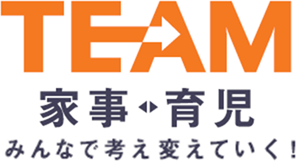


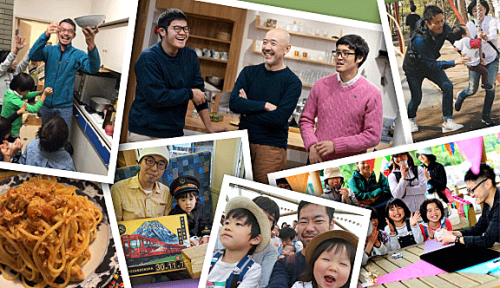








I knew he kept a diary, but I had never heard that he kept a diary for that long” (Chihaya, his eldest son).